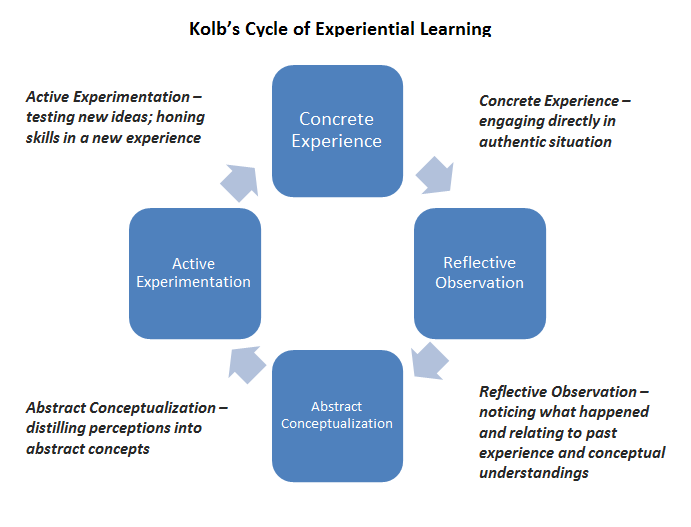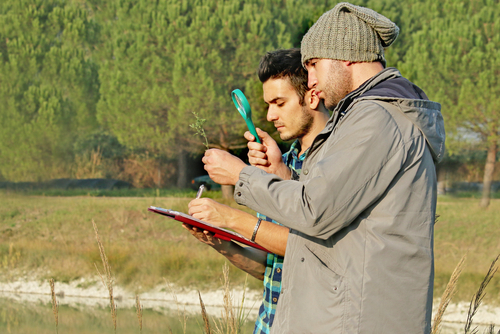This resource provides an overview of experiential learning, a process where students learn through hands-on experiences and reflection. It explains how experiential learning works, highlighting the integration of knowledge, activity, and reflection. It gives examples of various forms of experiential learning, including internships, service learning, and undergraduate research and introduces guidance on how it can be implemented.
Background
Experiential learning is an engaged learning process whereby students “learn by doing” and by reflecting on the experience. Experiential learning activities can include, but are not limited to, hands-on laboratory experiments, internships, practicums, field exercises, study abroad, undergraduate research and studio performances.
Well-planned, supervised and assessed experiential learning programs can stimulate academic inquiry by promoting interdisciplinary learning, civic engagement, career development, cultural awareness, leadership, and other professional and intellectual skills.
Learning that is considered “experiential” contain all the following elements:
- Reflection, critical analysis and synthesis.
- Opportunities for students to take initiative, make decisions, and be accountable for the results.
- Opportunities for students to engage intellectually, creatively, emotionally, socially, or physically.
- A designed learning experience that includes the possibility to learn from natural consequences, mistakes, and successes.
How does it work?
Kolb’s (1984) cycle of learning depicts the experiential learning process (see figure below). This process includes the integration of:
- knowledge—the concepts, facts, and information acquired through formal learning and past experience;
- activity—the application of knowledge to a “real world” setting; and
- reflection—the analysis and synthesis of knowledge and activity to create new knowledge” (Indiana University, 2006, n.p.).

What does experiential learning look like?
Experiential learning has the following elements (Association for Experiential Education, 2007-2014):
- Experiences are carefully chosen for their learning potential (i.e. whether they provide opportunities for students to practice and deepen emergent skills, encounter novel and unpredictable situations that support new learning, or learn from natural consequences, mistakes, and successes).
- Throughout the experiential learning process, the learner is actively engaged in posing questions, investigating, experimenting, being curious, solving problems, assuming responsibility, being creative, and constructing meaning, and is challenged to take initiative, make decisions and be accountable for results.
- Reflection on learning during and after one’s experiences is an integral component of the learning process. This reflection leads to analysis, critical thinking, and synthesis (Schon, 1983; Boud, Cohen, & Walker, 1993).
- Learners are engaged intellectually, emotionally, socially, and/or physically, which produces a perception that the learning task is authentic.
- Relationships are developed and nurtured: learner to self, learner to others, and learner to the world at large.
During experiential learning, the facilitators role is to:
- Select suitable experiences that meet the criteria above.
- Pose problems, set boundaries, support learners, provide suitable resource, ensure physical and emotional safety, and facilitate the learning process.
- Recognize and encourage spontaneous opportunities for learning, engagement with challenging situations, experimentation (that does not jeopardize the wellbeing of others) and discovery of solutions.
- Help the learner notice the connections between one context and another, between theory and the experience and encouraging this examination repeatedly.
Some forms of experiential learning include (Indiana University, 2006; Moore, 2010):
- Internships – A more broad term used to describe experience-based learning activities that often subsume other terms such as cooperative education, service-learning or field experiences. It is often a credit-bearing, free-standing activity in a student’s field of interest not connected to a theoretical course. It is usually assessed by a faculty member and supervised by an employer who is not a faculty member. The student may work with practicing professionals, complete a project, attend public events, interview and observe constituents and employees. The student may or may not be paid for this experience. When attached to a classroom course, a student may spend several hours a week volunteering in an agency, supporting co-curricular activities, shadowing a professional in the field, or observing people in their natural environments. Key to this form of experiential learning is some type of guided reflection. The mission of this experience may be to support the integration of theory and practice, explore career options, or foster personal and professional development.
- Service learning – This term is used to denote optional or required out-of-classroom community service experiences/projects attached to courses or a separate credit bearing experience. The location may be the broader community outside the university or one embedded in co-curricular activities. In these experiences, students participate in an organized service activity that meets identified community needs and reflect on the service activity to better understand course content and gain a broader appreciation of the discipline and an enhanced sense of civic responsibility.
- Cooperative education – Mostly a part of professional programs, students gain practical relevant work experience over a period of multiple terms that intersperse their coursework. Students alternate work and study, usually spending a number of weeks in study (typically full-time) and a number of weeks in employment away from campus (typically full-time). Alternatively, cooperative education may occur when students simultaneously attend classes part-time and work part-time during consecutive school terms in an intentionally planned and coordinated way. Students receive academic credit for cooperative education when the experiences meet the criteria for credit (i.e., faculty supervision, reflective components, evidence of learning). The purpose of these programs is to build student’s career skills and knowledge.
- Clinical education – This is a more specifically defined internship experience in which students practice learned didactic and experiential skills, most frequently in health care and legal settings, under the supervision of a credentialed practitioner. It is often is a separate credit-bearing course tied to a related theoretical course or a culminating experience after a sequence of theoretical courses.
- Student teaching – This experience is specific to students in pre-professional and pre-service teacher education who are gaining required and evaluated experience in supervised teaching.
- Practicum – A relative of the internship, this form of experiential learning usually is a course or student exercise involving practical experience in a work setting (whether paid or unpaid) as well as theoretical study, including supervised experience as part of professional pre-service education.
- Undergraduate research experience – Students function as research assistants and collaborators on faculty projects.
- Community-based research – Faculty and students cooperate with local organizations to conduct studies to meet the needs of a particular community. Students gain direct experience in the research process.
- Field work – Supervised student research or practice carried out away from the institution and in direct contact with the people, natural phenomena, or other entities being studied. Field work is especially frequent in fields including anthropology, archaeology, sociology, social work, earth sciences, and environmental studies.
- Study abroad – Students usually engage in courses at higher education institutions in another country. The experiential learning component is the cultural immersion which provides novel challenges for navigating living in a new place. The coursework connected to a study abroad can also include internships and service-learning experiences.
Research on experiential learning
Expand to view research
Last updated: July 5, 2024.
